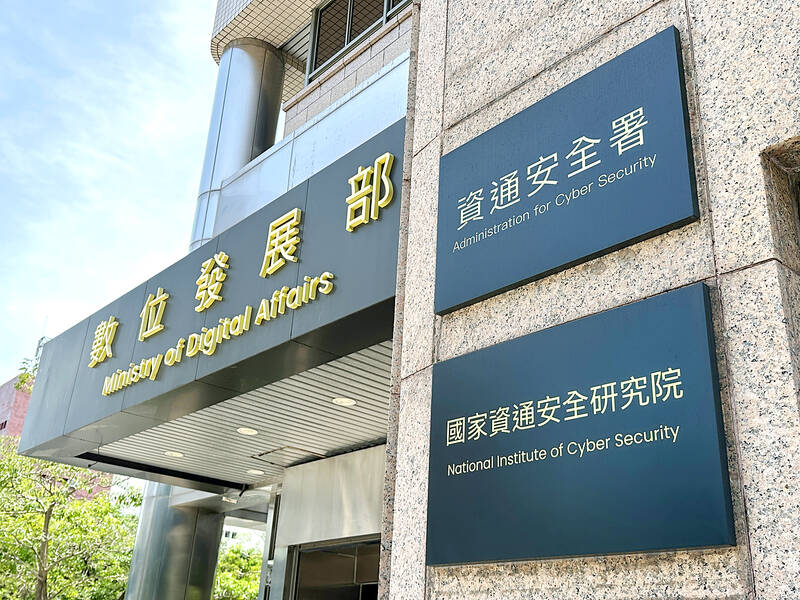Taiwan’s Ministry of Digital Affairs (MODA) announced yesterday that it will officially place Threads, a text-based social media app, under its anti-fraud regulatory framework, with the measures taking effect on Sept. 15.
Considering the online platform’s number of users in Taiwan and risk of it being used to publish fraudulent advertisements, Threads has been included under regulatory management, making it the seventh online advertising platform regulated under Taiwan’s anti-fraud law, the ministry said.
After the “Fraud Crime Hazard Prevention Act” was promulgated on July 31, 2024, MODA later that year ordered four major online platform operators: Meta, Line, TikTok, and Google to implement stronger anti-fraud measures in accordance with the law.

Photo:CNA
This requirement applies to six major platforms: Google, Youtube, Line, Facebook, Instagram and TikTok operated by the four companies.
With the addition of Threads, launched on July 5, 2023 by Meta, a total of seven platforms will have been brought under the new anti-fraud regulations.
The new law requires these platforms to verify advertisers, develop anti-fraud strategies, and promptly remove fraudulent content upon request. They must also publish transparency reports detailing their efforts at combating online fraud.
Threads’ inclusion under the regulatory management provisions came after several lawmakers recently expressed concern about the large user base of Threads in Taiwan and noted that it had not yet been regulated under the anti-fraud regulations.
In response, MODA launched a review to determine whether Threads should be included.
According to a statement released by MODA on Thursday, from Sept. 30 last year, its online scam reporting system received 1,898 reports involving suspected fraud on Threads, of which 718 were confirmed scams. As a result, the platform was notified and instructed to remove the fraudulent content.
Threads began offering advertising placements in April this year, thus meeting the definition of an online advertising platform, MODA said in the statement.
Given that the platform has a substantial user base in Taiwan and based on the number of fraud-related reports, MODA assessed that the risk of Threads being used to publish fraudulent ads is high, it said.
As a result, Threads was added to the regulated platforms list. Due to the time needed for system adjustments, compliance requirements will take effect on Sept. 15, according to the MODA statement.
In response, Threads’ parent company Meta said in a statement that it is currently reviewing relevant details regarding the inclusion of Threads under the anti-fraud rules.
“We are fully committed to combating fraud and criminal networks targeting users of online services,” Meta said.
It added that the company is strengthening its anti-fraud efforts through various measures, including investing in technology, alerting users to potential scams, providing anti- fraud tools, promoting public fraud awareness education and working closely with Taiwan’s MODA.

The Chinese military has built landing bridge ships designed to expand its amphibious options for a potential assault on Taiwan, but their combat effectiveness is limited due to their high vulnerability, a defense expert said in an analysis published on Monday. Shen Ming-shih (沈明室), a research fellow at the Institute for National Defense and Security Research, said that the deployment of such vessels as part of the Chinese People’s Liberation Army (PLA) Navy’s East Sea Fleet signals a strong focus on Taiwan. However, the ships are highly vulnerable to precision strikes, which means they could be destroyed before they achieve their intended

About 4.2 million tourist arrivals were recorded in the first half of this year, a 10 percent increase from the same period last year, the Tourism Administration said yesterday. The growth continues to be consistent, with the fourth quarter of this year expected to be the peak in Taiwan, the agency said, adding that it plans to promote Taiwan overseas via partnerships and major events. From January to June, 9.14 million international departures were recorded from Taiwan, an 11 percent increase from the same period last year, with 3.3 million headed for Japan, 1.52 million for China and 832,962 to South Korea,

SOVEREIGNTY: The rigs show that Beijing ‘rejects Taiwan’s jurisdiction’ by building in areas where Taipei demands permission to build or alter installations Chinese oil rigs have been sighted just 26 nautical miles (42km), from Taiwan’s exclusive economic zone (EEZ) near Pratas Island (Dongsha Island, 東沙島), posing a threat to Taiwan’s sovereignty if left unchallenged, a brief published by the Jamestown Foundation on Tuesday said. Pratas Island, 444km from Kaohsiung, is northeast of the South China Sea and houses a Taiwanese garrison. The brief, titled “Rigging the Game: PRC Oil Structures Encroach on Taiwan’s Pratas Island” — referring to the People’s Republic of China — analyzed photographs and said that Beijing’s tools to pressure Taiwan now include oil rigs. “Oil rigs now constitute part of Beijing’s

The Taiwan Experience Education Program (TEEP) has funded short-term internships in Taiwan for more than 4,500 young people from more than 40 countries since 2015, with the goal of attracting and retaining international talent, the Ministry of Education said yesterday. Fifty-five colleges launched 514 projects this year, including in fields such as semiconductors, artificial intelligence, medicine and biotechnology, green energy, and sustainability, it said. The program provides research and practical internships in Taiwan for two to six months, and offers cultural exchange and networking opportunities, the ministry said. For example, National Formosa University’s Embedded System and Autopilot Laboratory developed two solar-powered drones in